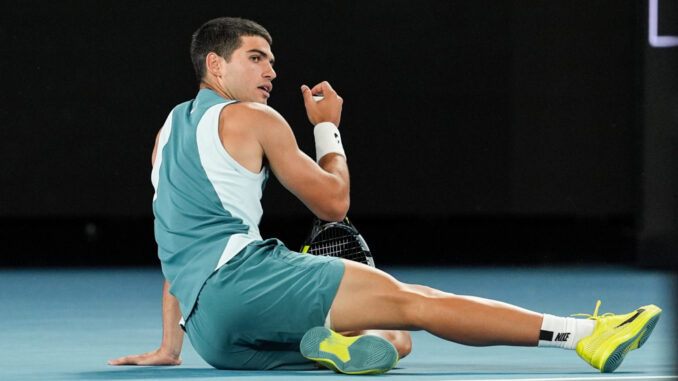
Carlos Alcaraz, the prodigious Spanish tennis star, is navigating a series of challenges as he approaches the Rotterdam Open. Reports have surfaced indicating that the young athlete is contending with fitness concerns, casting a shadow over his readiness for the tournament. The specifics of these fitness issues remain undisclosed, leaving fans and analysts speculating about their potential impact on his performance.
In addition to his physical hurdles, Alcaraz is experiencing a notable shift in his coaching dynamics. Traditionally guided by the seasoned Juan Carlos Ferrero, Alcaraz will enter the Rotterdam Open under the mentorship of Samuel López. This adjustment arises as Ferrero steps back temporarily, entrusting López with the responsibility of steering Alcaraz through this phase of the season.
The decision to integrate López into Alcaraz’s coaching team was not made lightly. López, who concluded a nine-year tenure with Pablo Carreño Busta, brings a wealth of experience and a fresh perspective to Alcaraz’s camp. His appointment is part of a broader strategy to bolster the young player’s support system, ensuring he has the resources necessary to navigate the rigors of the ATP tour.
Alcaraz’s arrival in Rotterdam was met with unforeseen complications. Upon landing, he faced an extended delay of over ninety minutes awaiting his luggage. Such disruptions, though seemingly minor, can add layers of stress, especially when coupled with existing fitness concerns and coaching transitions.
Despite these challenges, Alcaraz remains resolute. He has already commenced training sessions on the Rotterdam courts, notably practicing alongside Daniil Medvedev. These sessions are crucial, not only for acclimatization but also for assessing his physical readiness ahead of the competition.
The Rotterdam Open, an ATP 500 event, is renowned for its competitive field. Alcaraz’s participation is a testament to his ambition and commitment to measuring himself against the sport’s elite. However, the combination of fitness uncertainties and a restructured coaching arrangement presents a unique set of challenges.
The temporary absence of Ferrero, a pivotal figure in Alcaraz’s ascent, is particularly noteworthy. Ferrero has been instrumental in shaping Alcaraz’s game, providing strategic insights and mentorship that have propelled him to significant milestones. His decision to delegate coaching duties to López for the upcoming tournaments indicates a strategic move to diversify Alcaraz’s developmental inputs.
López’s integration into the team is anticipated to bring a renewed focus on specific facets of Alcaraz’s game. His extensive experience and tactical acumen are expected to complement the foundational work laid by Ferrero, offering Alcaraz a holistic coaching approach. This shift in coaching could provide an opportunity for Alcaraz to adapt new strategies and refine his gameplay, ultimately strengthening his long-term development.
Beyond the immediate adjustments, Alcaraz’s fitness concerns have sparked discussions regarding his overall schedule and workload. The demands of the ATP tour are relentless, with frequent travel, intense matches, and grueling training sessions. Managing his physical condition will be critical to maintaining consistency and avoiding further injuries that could disrupt his season.
Over the past year, Alcaraz has demonstrated an incredible ability to rise to challenges, securing major victories and cementing his place among the sport’s top players. However, with his recent struggles, the Rotterdam Open serves as a crucial test. It will gauge not only his current fitness level but also his ability to adapt to the absence of Ferrero and the guidance of López.
Alcaraz’s competitive spirit is well known, and his ability to recover from setbacks has been a hallmark of his young career. He has faced adversity before, whether through injury or tough losses, and has consistently found ways to bounce back stronger. This tournament will provide another opportunity for him to showcase that resilience and prove that he remains a formidable force on the ATP circuit.
The tennis world watches with bated breath, hopeful that Alcaraz will overcome these hurdles and continue his trajectory toward the pinnacle of the sport. His performance in Rotterdam will not only reflect his physical preparedness but also his capacity to adapt to evolving dynamics within his support system. Fans and analysts alike will be eager to see whether he can maintain his high level of play despite the ongoing adjustments.
Ultimately, Alcaraz’s response to these challenges will be instrumental in shaping the next chapter of his career. As he steps onto the court in Rotterdam, the stakes are high, but so is his potential. If he can navigate this period successfully, it will serve as yet another testament to his resilience and growing maturity as a player. Whether he emerges victorious or not, the lessons learned during this tournament will undoubtedly play a key role in his continued development as one of tennis’s brightest stars.
Leave a Reply